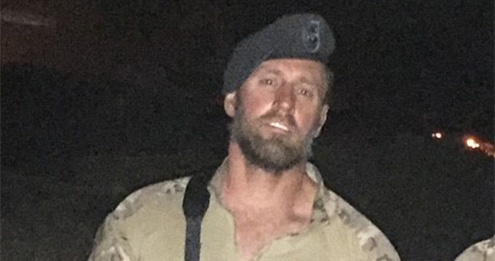- Active Duty
- Special Forces
- Cybersecurity
- National Guard
- Credentialing Assistance and Funding
Certification Spotlight
Credentialing success from the Service community
Green Beret leverages funding benefits for near-continual cybersecurity training and certification
Sergeant First Class David Denning initially joined the Special Forces with hopes of pivoting from his early-career cyber work. His skillset and knack for navigating bureaucratic processes brought him back to the discipline.
David Denning has used various funding avenues to attain more than 15 certifications. He credits his certification background with opening minds and facilitating conversations among various stakeholders unaccustomed to his unique dual role.

David Denning, Sergeant First Class, United States Army National Guard
Describe a typical day in your position.
I’m currently on Title 32 Active Duty Operational Support (ADOS) orders with the West Virginia National Guard (WVNG), where I work for the Army Interagency Training and Education Center. I am a cyber analyst on the Mission Assurance (MA) team that does MA assessments at critical infrastructure around the world and reports to Headquarters – Department of Army (HQDA). On the M-Day side of the WVNG, I am a Special Forces Engineer Sergeant.
When I go to a site to assess their cybersecurity posture, the hardest job that I have is to convince the site representatives that just because I show up in uniform from HQDA, that doesn’t mean I’m there to inspect them. I want to know the things in their environment that weren’t architected correctly and the processes that are forcing those choices, whether it’s funding, headcount, or policy. Once I convince them that I’m there to try and push resources to them to hopefully fix things, the interviews usually go much better.
I try to tell people to take advantage of the things that we have so that you can put yourself in a better position when you leave compared to when you walk in the door.
What impact did the funding support have on your desire and ability to earn the certification?
Price definitely makes a difference. You have to consider risk vs reward as well as what happens if you put in a lot of money and you don’t pass or if you change jobs. Is that certification going to make you look better or get you past filters to put you at the top of the resume list? I’m lucky that my company happens to pay for me to do these things which keeps me on the cutting edge of constantly changing technology. Why wouldn’t I take advantage of these when they’re available to me?
At a certain point, I will transition out of the military or I will retire, or maybe funding will stop before then. Whatever happens, I try to tell people to take advantage of the things that we have so that you can put yourself in a better position when you leave compared to when you walk in the door. There is a program called Army IgnitED which provides $4,000 a year for credentialing assistance. A lot of people don’t use it, and it’s not just for cyber. It’s for all sorts of credentials. If you have a school that you want to use, you can nominate them to get approved in Army IgnitED too.
A certification doesn’t mean that I’m an expert in everything, but it does show that I have a certain level of knowledge that someone else doesn’t have, and that I take this seriously and prepare myself.
Describe some of the unique challenges that you faced attempting to get certified while balancing your various roles.
I keep it as simple as I can. I have a notepad that I keep on my desktop and update with the dates of things that I have coming up. I also use a to-do list which helps me stay on target. I look at it every day and take items off or adjust accordingly. You do have to plan things out a little bit more and try to work with your command, depending on where you are and what you’re doing. I’ve gotten much better at ignoring other items on my to-do list besides what I am working on.
Have you noticed any impact that certifications have had on your career?
It does make a big difference when we interact with civilian agencies and there are contract companies that do the same thing that we do. They know who I am and that I’m very qualified at my job. When I go to these sites and they see me walk in the door with my Special Forces tab on my arm, they’re like “what is this guy doing?” I keep things really friendly, but every once in a while, they’ll try to throw out a curveball to test me. At one site, someone mentioned that they had two certifications, and I mentioned that I had both of them too, but then I listed off a bunch of others that I had, and that definitely changed the nature of our conversation. He ended up asking my advice on what training paths he should pursue.
Conversely, I’ve had arguments with people who say that certifications don’t mean anything. I would say that a college degree is just a larger certification. My Green Beret is just a certification. A certification doesn’t mean that I’m an expert in everything, but it does show that I have a certain level of knowledge that someone else doesn’t have, and that I take this seriously and prepare myself. When you hear about something happening on a news report and they mention that the person was not qualified, it makes you wonder what they could have done to be more qualified.
